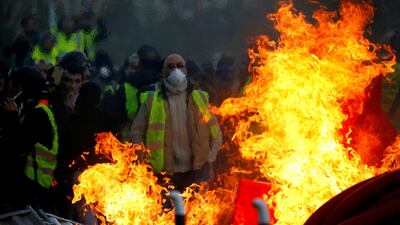French parliamentarians approved a controversial “anti-hooligan” bill that was drawn up response to the yellow vest movement and has provoked concerns over the government’s draconian response to protests.
The law, which passed in the lower house of France’s parliament by 387 votes to 92, must now be passed by the upper house and approved by the constitutional council.
Opponents of the “anti-casseurs” (anti-hooligan) law have warned the measure would curb civil liberties, including the right to protest.
France witnessed the most violent demonstrations since 1968 during the last few months of 2018, which began as a protest against fuel taxes. The demonstrators donned yellow fluorescent vests or “gilet jaunes”, which French motorists carry are required by law to carry in their vehicles in case of emergencies.
However, the grassroots, populist movement quickly spiralled into a wider demonstration against economic injustice and France’s centrist president, former investment banker Emmanuel Macron.
The protests, which have continued into February, have turned into mass riots involving the blocking of roads and fuel deports.
The new law allows local government prefects to take pre-emptive action in the face of protests including imposing orders against individuals that are considered likely to commit certain offences.
It is also introduced more draconian punishments for certain crimes, including a hike in the penalties for “voluntary concealment” of the face with a hood or other material which is now punishable by one year's imprisonment and a fine of €15,000, compared with €1,500 before.
The vote saw a rebellion among Mr Macron’s own parliamentary party, the Republic on the Move (LREM), for the first time with around 50 MPs abstaining from voting.
One critic called the measure a "law of fear" and compared it to past tyrannous legislation, as there was a law of sacrilege, which allowed conviction for offences against the institutions of government.
Protesters have already been infuriated by the police use of a new type of rubber bullet to break up the demonstrations. Disarm, an activist group has claimed there have been has been at least 100 serious injuries since Yellow Vest protests began in November from use of so-called sub-lethal Defence Ball Launchers (DBLs). It estimated that there have been at least 17 cases of people losing an eye.
The French ministry of interior said it had investigated 101 reports of injuries from the weapon but found only four cases of eye injuries.
Last week a top French court, the Council of State, refused an application to ban the device from the police front lines and said it was "necessary to allow security forces to use these weapons" to maintain order in urban areas.
Meanwhile Italy’s deputy prime minister Luigi Di Maio revealed that he had met leaders of the French yellow vest movement in a move that is bound to cause further tension between Rome and Paris.
Mr Di Maio, leader of the populist 5-star party, said he had met yellow vest movement head Christophe Chalencon and other members of the populist group who have been put forward for the European Parliament elections in May.
“The wind of change has crossed the Alps. I repeat. The wind of change has crossed the Alps,” Mr Di Maio said on Facebook, posting a picture of the meeting, which took place on the outskirts of Paris.
In a statement, Mr Di Maio’s office said he and Mr Chalençon had found “many positions and common values which put at the centre of so many battles citizens, social rights, direct democracy and the environment”.
Mr Di Maio and other officials from the 5 Star party are currently looking for European allies in the run up to the elections later this year.
Mr Chalençon did not confirm whether an alliance would be formed between the two populist movements but added that both sides “practically agree on everything”.
Since forming a populist coalition last year, Mr Di Maio and his fellow co-deputy prime minister Matteo Salvini have been outspoken critics of Mr Macron’s government, clashing mainly over migration.
In response to the meeting between the 5 star leader and Mr Chancelon, French European Affairs Minister Nathalie Loiseau said: "I’m not sure what being interested in the Yellow Vests has to do with the well-being of the Italians.”

